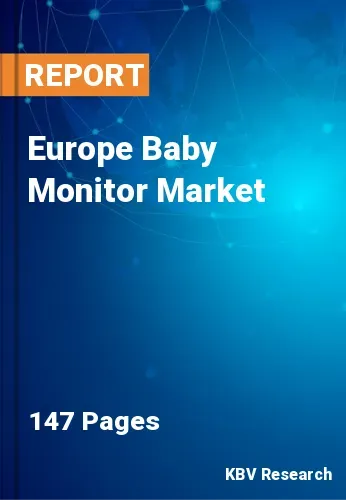The Europe Baby Monitor Market would witness market growth of 5.6% CAGR during the forecast period (2023-2030). In the year 2020, the Europe market's volume surged to 3,550.0 thousand units, showcasing a growth of 6.2% (2019-2022).
One of the most significant trends in the market is the integration of smart connectivity and Internet of Things (IoT) technologies. Smart monitors allow parents to remotely monitor their child's activities through mobile apps, providing real-time insights and alerts. This connectivity lets parents check in on their baby from anywhere with internet access, fostering peace of mind and convenience. The demand for video monitoring solutions has surged in recent years, with parents seeking a more comprehensive view of their baby's surroundings. High-resolution imaging and night vision capabilities have become standard features, providing clear visuals even in low-light conditions. This trend reflects a growing preference for visual reassurance and a desire for a more interactive monitoring experience.
Incorporating AI and ML technologies in these monitors has ushered in a new era of intelligent monitoring. These systems can analyze data patterns, detect unusual behavior, and even learn a baby's sleep patterns over time. Beyond traditional audio and video monitoring, modern baby monitors often include environmental sensors. These sensors can track room temperature, humidity, and air quality, giving parents insights into their baby's immediate surroundings. This tendency aligns with the increasing awareness of how environmental conditions impact a child's well-being.
Urban parents in Germany, like in many other regions, have a heightened concern for the safety and well-being of their children. With features like video streaming and real-time alerts, these monitors address these concerns and provide parents with a sense of security, even in different parts of their homes. The rise of urbanization is often accompanied by increased internet connectivity. This has made e-commerce accessible to a larger population in Germany, enabling urban parents to explore and purchase various of these monitor options from different brands and regions. The aforementioned factors will drive the market growth in this region.
The Germany market dominated the Europe Baby Monitor Market by Country in 2022, and would continue to be a dominant market till 2030; thereby, achieving a market value of $144.5 Million by 2030. The UK market is exhibiting a CAGR of 4.8% during (2023 - 2030). Additionally, The France market would experience a CAGR of 6.4% during (2023 - 2030).
Based on Type, the market is segmented into Video, and Audio. Based on Distribution Channel, the market is segmented into Retail Stores, Supermarket/Hypermarket, E-Commerce, and Specialty Stores. Based on Connectivity, the market is segmented into Wireless, and Wired. Based on countries, the market is segmented into Germany, UK, France, Russia, Spain, Italy, and Rest of Europe.
Free Valuable Insights: The Global Baby Monitor Market will Hit $2.2 Billion by 2030, at a CAGR of 5.8%
The market research report covers the analysis of key stake holders of the market. Key companies profiled in the report include Dorel Industries, Inc., Angelcare Monitors Inc., Summer Infant, Inc. (Kids2, Inc.), Samsung Electronics Co., Ltd. (Samsung Group), Koninklijke Philips N.V., Nokia Corporation, Teledyne FLIR LLC (Teledyne Technologies Incorporated), Google LLC (Alphabet Inc.), Lorex Technology Inc. and VTech Holdings Limited.
By Type (Volume, Thousand Units, Revenue, USD Billion/Million, 2019-30)
By Distribution Channel (Volume, Thousand Units, Revenue, USD Billion/Million, 2019-30)
By Connectivity (Volume, Thousand Units, Revenue, USD Billion/Million, 2019-30)
By Country (Volume, Thousand Units, Revenue, USD Billion/Million, 2019-30)

Our team of dedicated experts can provide you with attractive expansion opportunities for your business.

